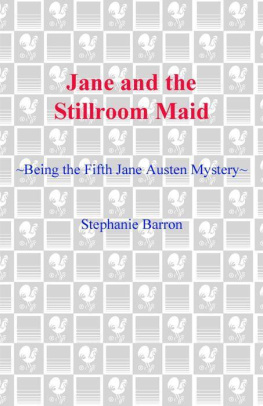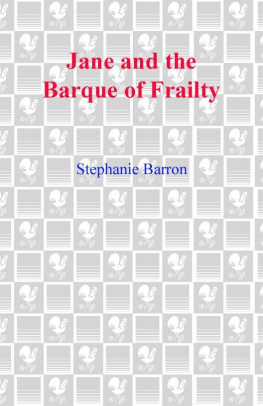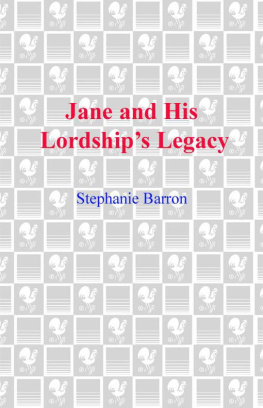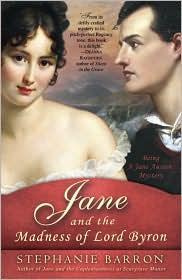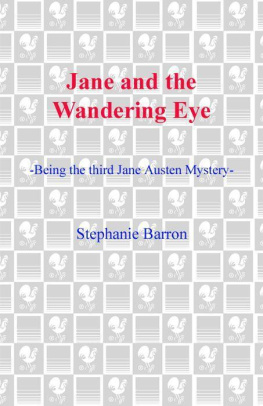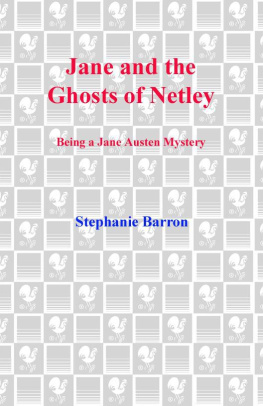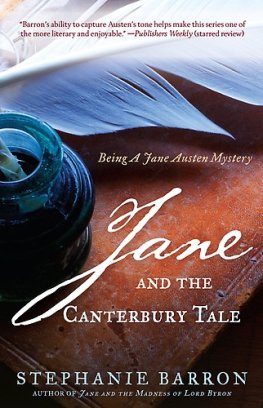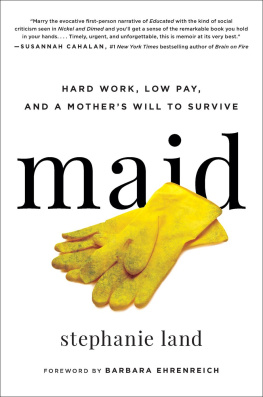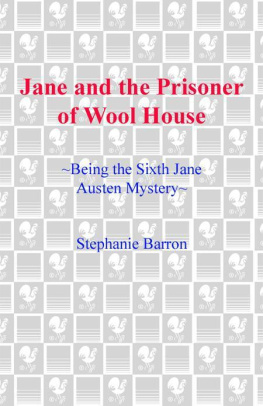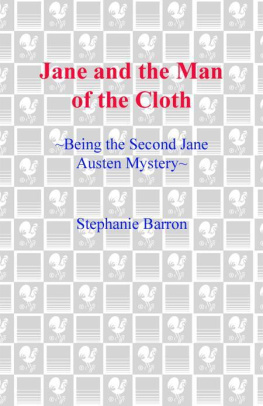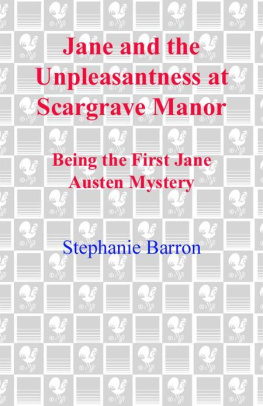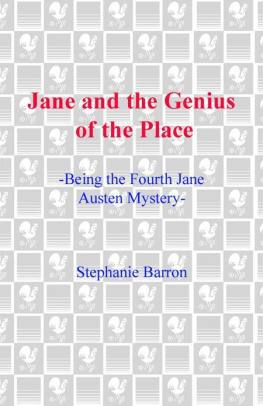Annotation
A chilling mystery with a solution that will leave you spellbound. Stephanie Barron does an excellent job of creating Jane Austen's world. Details of early 19th-century country life of all cases ring true, while the story line is clear, yet full of surprises.
Stephanie Barron
Jane and the Stillroom Maid
Being the Fifth Jane Austen Mystery
Dedicated to Carol Bauer Bowron, friend and writer, who carries a certain Pemberley in her heart
Editor's Foreword
THIS IS THE FIFTH OF THE AUSTEN MANUSCRIPTS I have been privileged to edit for publication since their discovery, in 1992, in the cellar of a Georgian manor house outside of Baltimore. I may say that I find it by far the most exciting, for it sheds light on Jane Austen's life and travels in 1806 that helps to confirm events only suspected before.
One of the most vividly described and memorable locations in all of Austen's novels must be the county of Derbyshire, where Fitzwilliam Darcy, the reticent hero of Pride and Prejudice, makes his home. Here Elizabeth Bennet is privileged to travel in the company of her relations, the Gardiners. The party tours Matlock and Dovedale before visiting Darcy's estate of Pemberley, where they unaccountably stumble across the owner. Elizabeth, in conversation with Darcy, refers to the inn at Bakewell, where she has been staying with the Gardiners -- and to this day there is a tradition in Bakewell that Jane Austen was once a guest at the town's principal Georgian inn, The Rutland Arms. She must have been to Bakewell, the local inhabitants reason; her description of the landscape surrounding Pemberley accords so closely to the town's physical reality. Furthermore, she imputes to Elizabeth Bennet an enthusiasm for the beauties of the Peaks that sounds entirely genuine.
Austen scholars, however, have contested for years The Rutland Arms' claim that Jane was a guest during the summer of 1811; for in 1811, as all good Austen scholars know, she was far from the Midlands and the Peaks.
A few voices, however, have lately suggested that Jane might have visited Derbyshire during the summer of 1806, while staying with her cousin Edward Cooper in neighboring Staffordshire. During the seven weeks she spent in a rectory in Hamstall Ridware, Staffordshire, Austen would have been but forty miles from the sites she later describes in Pride and Prejudice. George Holbert Tucker, author of Jane Austen the Woman, is inclined to support fellow academic Donald Greene, who argues that Darcy's fictitious home corresponds in its broad outlines to Chatsworth, the great estate of the dukes of Devonshire. Certainly it is true that the entire Cooper family succumbed to whooping cough during the Austens' visit -- and for this reason, as well as from a possible desire to tour the Peak District, Edward Cooper may have carried the Austen ladies into Derbyshire. No letter has survived in Jane's hand, dated late August 1806 from the town of Bakewell, but that should hardly be surprising. She was, after all, traveling with her chief correspondent, her sister Cassandra -- and any number of Austen's letters have been destroyed over the years.
Jane and the Stillroom Maid thus comes as a revelation. Here is the complete story of that singular week in 1806, when Austen saw the original of the great house she would use as one of her models for Pemberley. She was writing sporadically, if at all, during this period, having abandoned The Watsons--a decision most Austen scholars ascribe to persistent grief for her late father and the unsettled nature of the Austen ladies' domestic arrangements. Some part of Jane's Derbyshire experiences must have lingered powerfully in memory, however. When she once more took up her pen, the outlines of Bakewell and Derbyshire would be traced in the landscape of Pemberley House, and a bit of Charles Danforth in the character of Fitzwilliam Darcy. Is it too great a leap of the imagination to claim, indeed, that but for this 1806 trip to Derbyshire we might never have seen a revision of First Impressions--the novel we now know as Pride and Prejudice?
STEPHANIE BARRON
GOLDEN, COLORADO
SEPTEMBER 1999
Chapter 1
The Butterfly on the Stone
Tuesday
26 August 1806
The Rutland Arms, Bakewell, Derbyshire
MR. EDWARD COOPER -- RECTOR OF HAMSTALL RIDWARE, Staffordshire, Fellow of All Souls, devoted supplicant before his noble patron, Sir George Mumps, and my first cousin -- is possessed of a taste for hymns. He sings without the slightest encouragement or provocation, in a key entirely of his own choosing. Were he content to sing alone, in a subdued undertone befitting one of his dignity and station, all might be well. But Mr. Cooper has achieved a modest sort of fame as the composer of sacred music; and like the ardent shepherd of many a flock, must needs have company in his rejoicing. There are those who profess to admire my cousin's wistful baritone and remarkable lyrics -- Sir George Mumps himself is said to have presented the Staffordshire living on the strength of his esteem -- but Jane Austen is not among them. Were Mr. Cooper to sing airs in the Italian, before an audience of five hundred, I should still blush for his execution and taste. My cousin is a very good sort of man, his compassion and understanding quite equal to the duties of his parish; but his strains are not for the enduring, of an early hour of the morning.
I was blushing now, as I rolled towards Miller's Dale in the heart of Derbyshire behind the horse of Mr. Cooper's excellent friend, Mr. George Hemming; and I foresaw a morning's-worth of mortification in store, did my cousin continue to sing as he had begun. I had borne with Mr. Cooper's hymns through his dawn ablutions; I had borne with a determined humming over our morning coffee. And as the pony trap rolled west through a remarkable spread of country, I now reflected that I had borne with a stream of liturgical ditty for nearly a fortnight. To say that I possessed an entire hymnal of Mr. Cooper's work writ large upon my brain was the merest understatement. I heard his powerful strains in my sleep.
"Is it not a beautiful morning, Jane? Does not the heart leap in the human breast for the greater glorification of God?" Mr. Cooper cried. "Pray sing with me, Cousin, that the Lord might hear us and be glad!"
Poor Mr. Hemming cast a troubled glance my way. He was but an instant from a similar application, and I read his distress in his looks. My cousin's talent, we may suspect, had progressed unnoticed by his friend during the long years that interceded between their first acquaintance, and this latest renewal; had Mr. Hemming known of the recital we were to receive during our journey to Miller's Dale, he might well have retracted his invitation. I had long ago learned the surest remedy for Mr. Cooper, however, and I now hastened to employ it. Even the least worldly of men may be prey to vanity.
"Do not destroy all my pleasure in hearing you, Cousin, by requiring me to sing myself!" I cried. "My voice should never be joined with yours; it is not equal to the demands of the performance. Nor, I am certain, is Mr. Hemming's. Pray let us rest a little in your art, and be satisfied."
Mr. Cooper beamed, and commenced a tedious five verses of "The Breath That Breathed O'er Eden."



